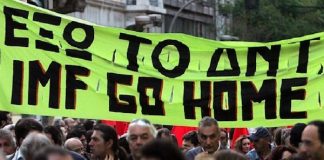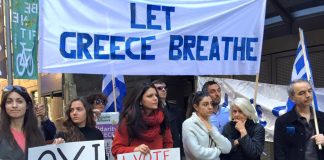Ireland
Varoufakis and Democracy, Left and Nationalism
DDP note: Wayne Hall, who is a friend of the Delphi Initiative and also a centrally registered member of Diem25 has addressed us the...
Ireland, Sinn Fein and Brexit: Does European “radical” left has some...
By Sputnik
Original Post date: 22 January 2017
President of Sinn Fein Gerry Adams says pulling Northern Ireland out of the EU along with the rest...
IMF explaining its own contribution in destroying South Europe
The Independent Evaluation Office (IEO) of the IMF recently published its report on the response of the organization to the European crisis. The analysis focuses on the performance of the IMF in the context of the programs for Greece, Portugal and Ireland. It provides a valuable insight into the conflicts within the IMF itself, and especially between the executive board of the organization and its management and staff.
Free Movement of Labour and Brexit: Reclaiming National Sovereignty or a...
A ‘positive nationalism’, therefore, in contrast to insular reactionary nationalism, is both ‘popular’ and ‘democratic’. Its content is defined against, in the first instance, national ruling elites and involves ‘decisive struggles’ for democratic rights. Such struggles also have the inherent potential to interlink with other national struggles of a similar democratic and popular nature
The Unrepentant IMF!
Despite the persistent effort of the Greek Media to present the report issued by the Independent Evaluation Office on July 8, which examines the contribution of the IMF on the “rescue” plan of three countries (Greece, Ireland and Portugal) as a “public apology”, the facts belie them.
Sinn Fein calls for referendum on united Ireland
Sinn Fein has called for a referendum on a united Ireland after accusing English voters of "dragging Northern Ireland out of the EU".
In Northern...
Ireland: The Easter Rising: Comrades of ours
Ireland: The Easter Rising: Comrades of ours
By Geoffrey Bell,
writer,
his latest book, Hesitant Comrades, the Irish Revolution and the British Labour Movement, has just been published...
Is the EU collapsing? (The Dutch earthquake)
by Dimitris Konstantakopoulos
Dutch voters spoke again, as they had spoken in June 2005, when they rejected, along with French voters, the proposed European Constitutional...
EU lies on Cyprus, Ireland, Portugal and Greece
Mr. Yanis Varoufakis in an interview that he gave in a Greek internet site pressproject.gr on the 8th of March respondent to a comment...
Irish Elections and the day after tomorrow
By Stathis Habibis
The Irish elections were a slap in the face of the parties applying austerity policies, not a devastating slap, but at least...









